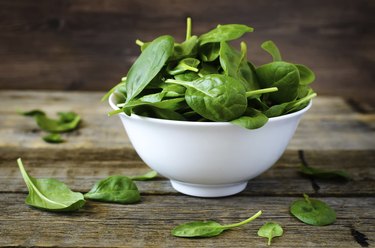
Tripping on the stairs, dropping an object on your foot or accidentally running into something can all result in bruising your skin. Aging, vitamin deficiencies, certain medications and gender can also make you more susceptible to the two types of bruises -- hematomas or ecchymosis. These bruise types differ as ecchymosis is a blood collection under the skin causing a purple, flat bruise, while hematomas are more of a blood clot causing a painful, raised area. Certain nutrients in your diet can contribute to the healing and prevention of bruising. Ensure you regularly get enough of vitamins C, K, B12 and folate.
Vitamin C Sources
Video of the Day
According to Cleveland Clinic recommendations, incorporating foods with vitamin C into your diet can help improve your body's response to a bruise. Your body cannot make this antioxidant, known for healing wounds and repairing tissues, and requires regular replenishment from the foods you eat. The recommended dietary allowance is 75 milligrams for people assigned female at birth and 90 milligrams for people assigned male at birth. Eating a balanced diet makes it simple to choose foods with plenty of vitamin C. Make a salad with spinach and red or green peppers, snack on fresh pineapple, cantaloupe or watermelon and drink an occasional glass of low-sodium tomato juice or unsweetened vitamin C-fortified beverages.
Video of the Day
Choosing Vitamin K Foods
Vitamin K is a second nutrient needed for healing bruises. A deficiency in vitamin K can result in slow blood clotting and cause you to bruise more easily. To promote normal blood clotting, adequate intake of vitamin K for adults ranges from 90 to 120 micrograms per day. Main sources of vitamin K are leafy greens and small amounts of oils. Eat salads with spinach and kale, add Swiss chard or broccoli to pasta or soups and cook with canola or olive oil.
Importance of Folate
Recovery from bruising is supported by folate, one of the B vitamins. In foods requiring supplementation, folic acid is a synthetic form of folate used. Since this nutrient is necessary for cell division and other processes, regular intake encourages your body to heal after getting a bruise. The folate RDA is set at 400 micrograms per day for individuals 14 and older. Individuals at risk from a folate deficiency are people with alcohol use disorder, pregnant people and those with malabsorption disorders. Choosing a diet with fruits and vegetables, legumes, nuts and folic acid-fortified foods can help meet your daily needs. Dine on soups with spinach and dried beans or peas, select oranges or bananas as snacks or consume fortified bread or pasta as part of a meal.
Vitamin B12 Food Selection
A diet rich in foods with vitamin B12 can promote your body's ability to heal bruises. Supporting platelet production for normal blood clotting is one of this vitamin's roles. Deficiency for vitamin B12 is common in vegetarians, older adults, individuals with gastrointestinal disease or pernicious anemia and those who have had bariatric surgery. The RDA for this nutrient is 2.4 micrograms for adults. This goal can be met by choosing foods supplemented or with natural vitamin B12. Select main dishes with fish, chicken or eggs, choose fortified cereal at breakfast and add low-fat dairy to your diet to meet the recommended intake.
Is this an emergency? If you are experiencing serious medical symptoms, please see the National Library of Medicine’s list of signs you need emergency medical attention or call 911.